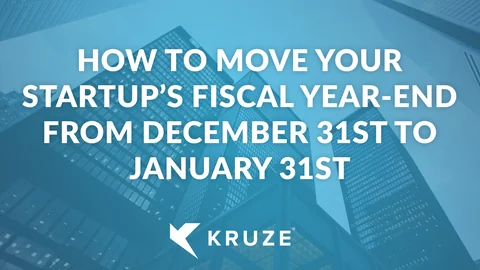
Startup founders, do you want to know how to move your startups’ fiscal year-end from December 31st to January 31st? Well, you’ve come to the right place. This is a question that we often get from our clients. This article will explore not only the benefits and drawback to changing your fiscal year, but also how to do it.
How to change from a December 31st Fiscal Year to End to a January 31st Year End:
- Create a short year financial statement for Jan 1 - Jan 31.
- File 2 Tax Returns for these periods: Calendar Year End (December) and then a short year 30-day return for January. (Check out our startup C-Corp tax deadlines; lots of tax and compliance dates will NOT change when you change your fiscal year, so keep that in mind.)
- File a form with the IRS that lets them know you are changing your fiscal year - File 1128.
Why do startups move their year-end date?
- You get the month of December Budget Flush and then pick up another month (January) where new IT processes have been budgeted, and buyers want to move fast. Double-dipping, so to speak.
- Also, the Sales & Accounting Teams can enjoy their Christmas & New Year. Otherwise, they are pinned to the phone and processes.
- Save a little money on Audit Fees since it’s slightly off season (marginal at best).
- Also, don’t forget the grandfather of all SAAS. Salesforce does it. Imitate the best.
Drawbacks of moving your startup’s year-end date:
- It will be confusing as heck for your accounting team at first.
- The headache and complexity of making the change of date.
- Generally, I would advise this when you have a fully built out Accounting, Finance, and Tax Team. If you’re early stage and still working with professionals like Kruze on your Accounting and Taxes, then it makes things a little too complex. We can do it, it’s just more complicated, and that’s usually bad for startups.
Deciding to change your startup’s fiscal year from December 31st to January 31st really depends on your company’s needs. It is something you can discuss with your CPA. This is a subject that we often tackle with our startup clients.
As always, should you have any questions or need assistance, please feel free to reach out to us. Our expert startup accountants will be happy to help.















